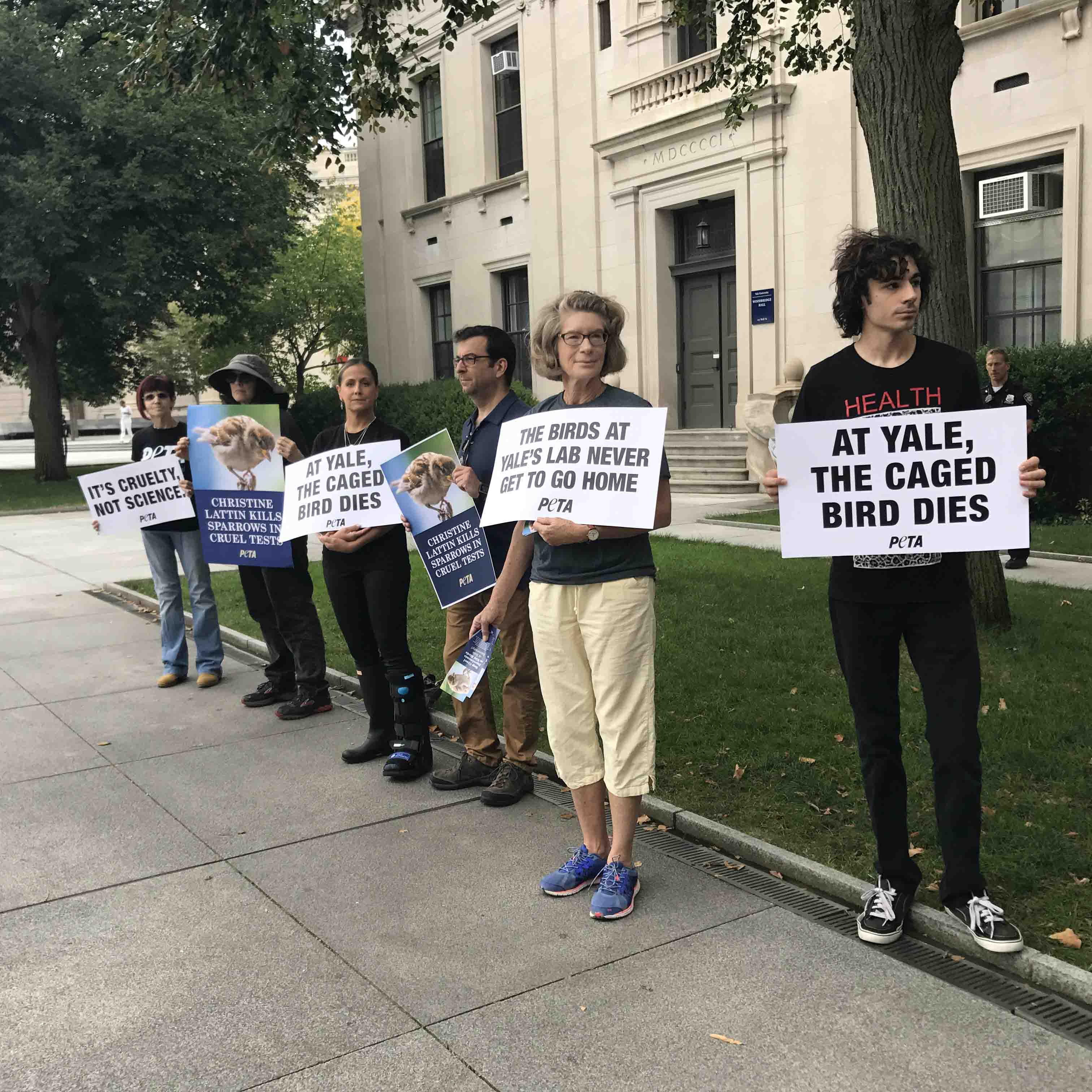
Around 15 protesters at a demonstration outside the Yale Corporation’s October meeting on Saturday morning called for the University to end its support for the research of postdoctoral associate Christine Lattin, whom they accused of carrying out inhumane experiments on sparrows.
Trustees hurrying into Woodbridge Hall were met by activists bearing signs that read “At Yale, the Caged Bird Dies.” People for the Ethical Treatment of Animals, the animal welfare group that held the rally, claims that since 2008 Lattin has killed 250 birds at both Tufts University and Yale in experiments studying responses to stress in sparrows.
But in an email to the News, Lattin said all her studies are approved by Yale’s Institutional Animal Care and Use Committee, which oversees the enforcement of federal, state and Yale’s own regulations for animal experimentation. Lattin said her lab and facilities undergo regular inspection and that her work also complies with the Ornithological Council’s “Guidelines to the Use of Wild Birds in Research.” She added that other scientists and veterinarians oversee the birds used in her studies to ensure they maintain good health during captivity.
“I care deeply about the well-being of the birds and try to minimize any potential suffering or distress they might experience,” said Lattin, who worked at a wildlife rehabilitation center for sick and injured birds of prey before beginning graduate school.
Lattin’s research seeks to understand how stress shifts from a helpful to a harmful stimulus in animals. Using sparrows, her experiments examine the role of different neurotransmitters and hormones in animals’ choice of mates, child rearing and self-preservation in psychologically challenging situations. Her current research is focused on developing medical imaging techniques to facilitate the study of receptors in living sparrows. Such imaging technology would allow her to use fewer animals in her research and, ultimately, release them back into the wild for study over time, Lattin said.
A PETA report detailing alleged animal suffering in Lattin’s experiments — which the organization provided to the News — accuses Lattin of confining the birds to cloth bags, rolling them in a cart and restraining them for long periods of time, among other acts of animal cruelty.
But according to Yale spokeswoman Karen Peart, oversight officials at the University have determined that there was no evidence of noncompliance with regulations or inappropriate care of animals in Lattin’s research. The Office of Laboratory Animal Welfare, a federal agency, has also concluded that PETA’s allegations were unsubstantiated.
“Dr. Lattin’s research represents a valuable contribution to a growing body of knowledge that will help advance, among other things, veterinary medicine, animal conservation and animal model development,” Peart said. “Virtually all medical advances of the last century would have been impossible without animal research.”
Although the University committee outlines indicators of stress in birds and defines a humane endpoint, its policies allow researchers to use death as an experimental endpoint after providing scientific justification and a monitoring plan to committee members.
“[The experiments] reflect a deliberate, unnecessary infliction of suffering and disregard for salient lives,” said Hanh Nguyen ’17, a demonstrator and campaign liaison for Peta2, PETA’s youth division. “It’s critical to remember that these oversight bodies often weigh in favor of the experimenters. No experiment is illegal.”
Byrne, along with four other protesters interviewed by the News, said the results of Lattin’s experiments have been proved inapplicable to human beings because of anatomical differences between the species.
But Lattin said the hormone and neurotransmitter pathways she studies are similar to those in all vertebrate animals, adding that, because of this, sparrow research can offer valuable scientific insight into humans and other animals. Studies on the physiology of stress in sparrows could lead to new treatment and medicines, she said.
“Animal research plays an essential part in the development of human and veterinary medicine and in wildlife conservation and protection,” Lattin said. “The reason I use wild birds in my research is that we can’t completely understand stress by only studying animals that were born in a cage, because captive-born animals don’t have the same range of physiological and behavioral responses to stress that wildlife and humans show.”
Peart said advancements in medicine are a cumulative product of smaller, often basic and mechanistic studies. It may be difficult to understand an individual experiment’s relevance to the wider scope of medical advancements, she added.
Though the protesters waiting outside Woodbridge Hall did not get a chance to discuss their concerns with trustees, they expressed hope that the Corporation uses its influence to stop Lattin’s inhumane experiments.
Rocky Barry, a volunteer at PETA, said that scientists at Yale should use more contemporary scientific methods to study birds, such as computer modeling.
“A lot of the research that’s being done at Yale is people in white lab jackets — they’re barbarians, in my opinion, masquerading as scientists,” protester Regina Milano said.
Saturday was not the first time PETA has accused Lattin of cruelty in her experimental methods. More than 150,000 people have called on Yale to halt Lattin’s experiments through the organization’s action alert, according to Tasgola Bruner, media manager for PETA’s Laboratory Investigations and Regulatory Testing Division. Bruner also said that Ingrid Taylor, a veterinarian in the department, sent a letter and report to University President Peter Salovey in June detailing instances of animal cruelty in Lattin’s experiments. She added that Taylor sent a follow up email last week but that University officials have yet to respond.
PETA also submitted a complaint to the district attorney in Massachusetts asking for cruelty charges to be filed against Latin, who researched at Tufts.
According to Latin, PETA organized a protest outside her home a few weeks ago, adding that it is “scary” that PETA repeatedly publishes “misinformation” about her studies alongside her name, home address and photograph.
Yale was granted its first University-wide accreditation by the Association for Assessment and Accreditation of Laboratory Animal Care International in 1994.
Hailey Fuchs | hailey.fuchs@yale.edu







